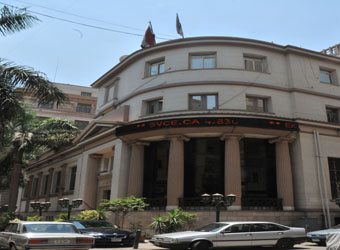The year 2012 was an eventful one for Egypt. It saw a parliament elected then dissolved, a military junta ousted and a civilian president assuming power. Many controversial laws, decrees and constitutional declaration were issued and cancelled.
Expectedly, the stock market reacted to each and every incident taking place in the country.
While the market gained 50.8 per cent by the end of 2012, positioning it as the third best performing in the world, it witnessed severe fluctuations throughout the year.
Ahram Online recounts the five main milestones that influenced the Egyptian exchange during the year.
Orascom’s Fame & Mobinil’s Deal
By the end of February 2012, the main index has gained roughly 47 per cent, edging to 5,225 points while the daily turnover rose to above EGP 600 million ($96 million) and this jump was down to two important incidents.
First: The announcement that shares of the renowned private telecommunications company Orascom Telecom (OT) (ORTE.CA) would resume trading after Russia’s VimpelCom bought majority shares from Egyptian tycoon Naguib Sawiris.
The acquisition of (OT) resulted in its split into two separate companies, one of which was Orascom Telecom Media and Technology (OTMT), which included assets excluded from VimpelCom’s takeover.
Second: France Telecom’s offer to buy the Egyptian Company for Mobile services (Mobinil) (EMOB.CA), which was owned by Sawiris as well, in late February.
Following the preliminary deal between Sawiris and France Telecom, Egypt’s EGX30 stock index gained 4.2 per cent in one day; its biggest daily gain in six months.
SCAF’s Constitutional Decree & Dissolution Of The Parliament
In June, Egyptian stocks were hit by significant losses as they did not welcome the news of the Constitutional declaration by the Supreme Council of Armed Forces (SCAF), the country’s then rulers, which gave the military powers that superseded those of the president.
This declaration followed the historic verdict of Egypt’s constitutional court to dissolve the lower house of the parliament.
The EGX30 index hit a 5-month low when it dipped 3.4 per cent, recording 4,267 points. The bourse’s capital also plunged by EGP 7 billion ($1.1 billion) to reach EGP 314.3 billion ($49.3 billion).
Morsi’s Presidency
After Mohamed Morsi was announced as Egypt’s country’s first freely elected civilian president, the market started a healthy recovery from the blows it suffered due to the pre-elections uncertainty.
EGX30 witnessed its sharpest climb since the 25 January uprising, as it rose a whopping 7.59 per cent to 4,483 points and the total daily turnover was EGP 519 million ($86m) in the session that followed the announcement of Morsi’s victory.
Morsi’s Hundred Days
During the first 100 days of Morsi’s presidency, the market performance improved substantially; reaching some 5,800 points by October 2012.
On 6 October, President Mohamed Morsi gave a lengthy speech to recount the achievements of the first three months of his term, focusing on five main points: security, traffic, fuel, garbage and bread.
Many independent observers believed that Morsi had failed fulfill his promises, and that was reflected by the stock market.
The EGX30 lost 2.16 per cent from its value as it slumped to 5,696 points from 5,822 points. The market’s capital also tumbled by EGP 20 billion ($3.1 billion).
Black November
The most prominent milestone came in November when President Morsi issued the constitutional decree which shielded his decisions from judicial review. The decree angered many Egyptian judges, who said it impinged on their authority.
The declaration also replaced the prosecutor-general, who Morsi had attempted to remove several weeks earlier but could not due to a legal barrier. Violent clashes erupted in front of the presidential palace between the President’s supporters and his opponents, leaving 11 people dead and hundreds injured in one of the bloodiest incident of the year.
The market reacted sharply to the violence in the streets.
EGX30 fell 9.5 per cent in a black session to below 5000. The broader index EGX70 tumbled 8 per cent.
Some news report also said the bourse dropped around EGP 33 billion ($5.2 billion) of its capital following Morsi’s decree.


